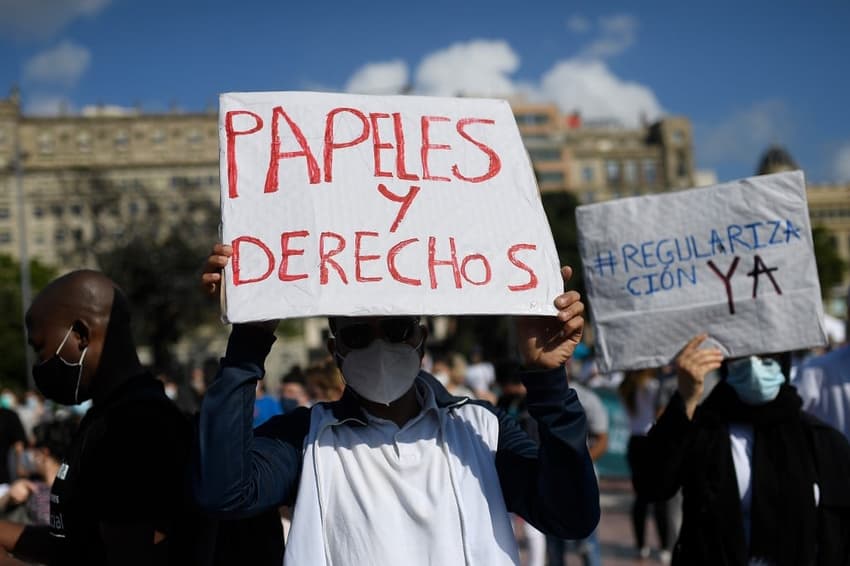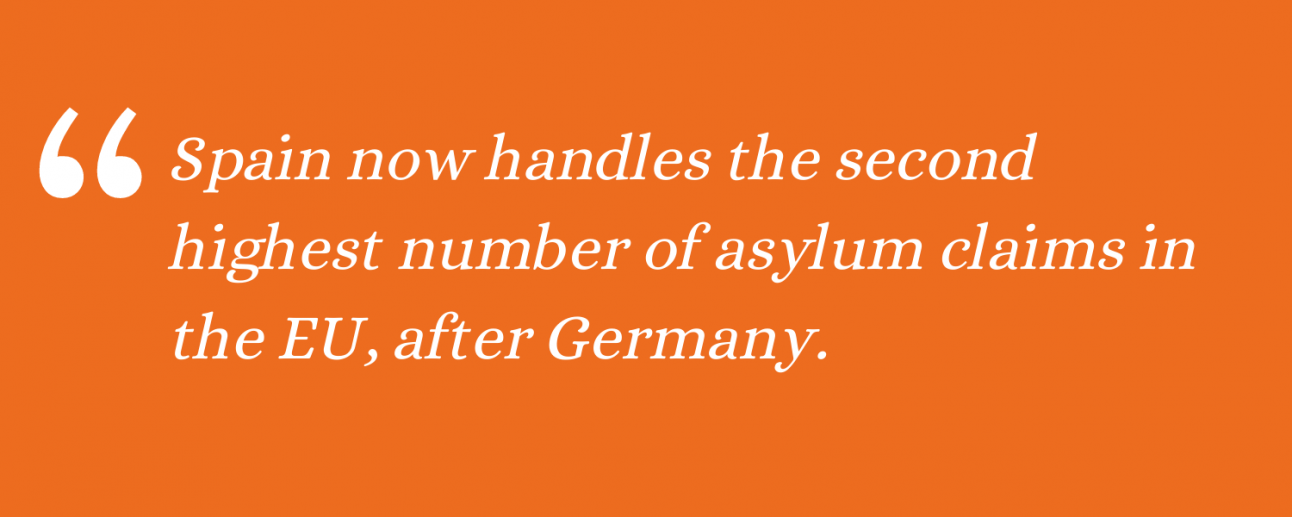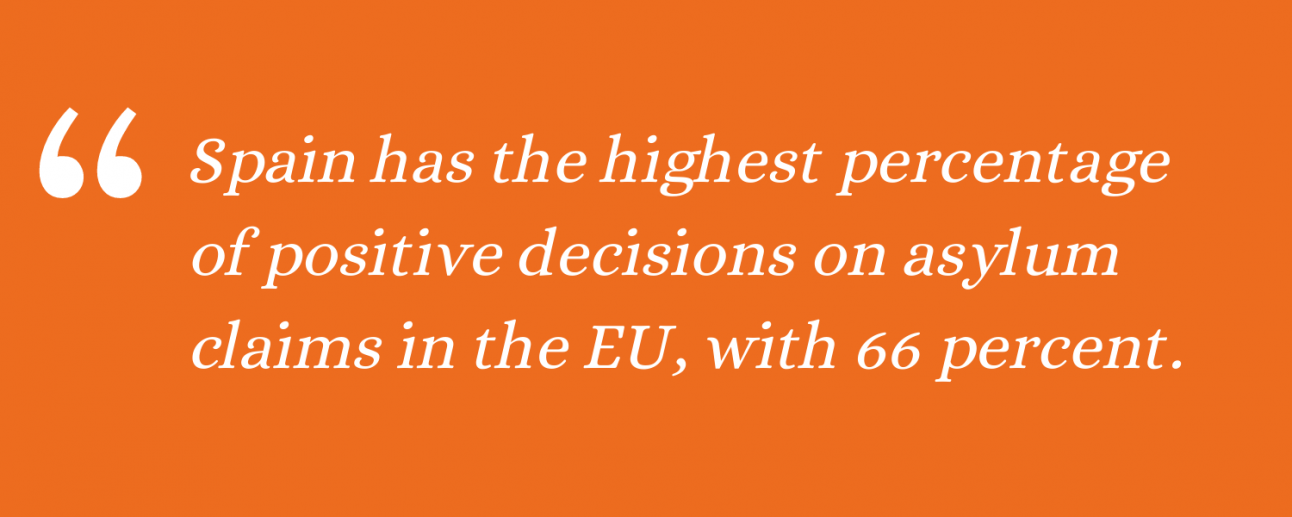How is Spain's asylum system coping with a record increase in applications?

As Spain deals with its highest ever number of asylum applications, how can the government try to ensure the process is both efficient and fair?
This article is part of Changing the Narrative. Articles in this series are written by student or early career journalists who took part in The Local's training course on solutions-focused migration reporting. Find out more about the project here.
When a migrant first presents a claim for asylum in Spain – or anywhere in Europe – they enter into a temporary and uncertain status. The Spanish government allows for up to six months before deciding on their claim. During this time, three different government agencies study the case and the asylum seeker may wait under the care of a government reception centre or NGO – unable to take some key steps towards integrating into Spain, such as finding a job, and uncertain of whether they’ll even be allowed to.
An efficient administrative system for handling the cases is a necessity. The EU has proposed reforms towards this end that would coordinate the procedures across Europe. Last year the Spanish government drafted a law proposal with measures that adapt to the EU's requests for asylum procedures. The measures included setting a deadline of 30 days after arrival for asylum seekers to submit their claim and allowing coming from a so-called "safe country" as a reason to deny a request. By and large, the measures make it quicker to reject certain claims.
Spain's ability to handle asylum cases has been put to the test in recent years more than ever before. According to Eurostat, Spain received a record high number of asylum claims with 117,800—up from 54,050 the year before, which had been enough to draw concern from experts and local authorities. The 118 percent increase from 2018 to 2019 was the highest of any member state of the European Union. Citizens of Venezuela (40,906) and Colombia (29,363) accounted for 59 percent of the asylum claims in Spain for 2019.

What’s more, according to data from Eurostat the numbers for 2020 are on pace to approach those of 2019, even amongst travel restrictions due to the Covid-19 pandemic. Spain now handles the second highest number of asylum claims in the EU, after Germany.
So how is the Spanish system coping with this increase in applications? According to a recent report from the Asylum Information Database, the duration of the asylum request process can last anywhere from three months to two years in practice and it can depend on the nationality of the applicants. The report also cited difficulties in accessing the appointment that formalizes the asylum request—as of April 2020 it takes six months on average to get this appointment. The backlog of pending cases went up from 35,261 at the end of 2017 to 111,740 at the end of 2019.
Even after the surge in asylum applications and amid an ever-increasing backlog, Spain had the highest percentage of positive decisions on asylum claims in the EU with 66 percent. Luxembourg was second at 56.7 percent and with far fewer claims. It is worth noting that these positive decisions mainly come in the form of authorisations to remain for humanitarian reasons, which—unlike refugee status—last only one year. These authorisations may be renewed.
MORE IN THIS SERIES:
-
The Spanish project keeping migrant mothers away from trafficking networks
-
How legal information can support refugees' fight for their rights in Germany
-
Why women in Danish asylum centres are taking up football
In an attempt to reduce the timeframe to process these claims, the government has, over the past year, been increasing the personnel working for the OAR, the government agency that processes asylum claims. In March 2020, the OAR eliminated second interviews from their process and the Social Work Units, a government program aimed at helping asylum seekers with financial difficulties, started doing their interviews over the phone.
A spokesperson for the OAR replied to a request for comment stating that the process of seeking asylum has not changed over the past year in Spain and highlighted their commitment, over the past year, to increase their staff. The OAR is currently in the process of increasing personnel, which had been set at 60 employees since 1992, to 291.
In their 2020 migration report the NGO CEAR (Spanish Commission for Refugees) acknowledged the efforts of the Spanish government and praised the plans to increase staff and introduce new legislation to optimize the asylum process. However, they said many obstacles remained, calling the system “rigid” and maintaining that nothing else will be as effective as providing individualized attention per case and legal assistance from the moment the asylum seeker arrives in Spain.
READ ALSO: How law students in Germany are providing free advice to asylum seekers
In its report the CEAR cited delays and inconsistencies between cities at the time of making the appointment that formalizes the request for international protection. At the end of 2019 they found that at a given date the appointments were set for three weeks later in Madrid and for two to three months later in Bilbao. This can put people in a vulnerable situation because they are not granted documentation of their status until this appointment and thus cannot prove that they are not in Spain irregularly.
CEAR’s main suggestion for avoiding these difficulties is to make a commitment to assign each asylum seeker individualized attention. There has been some precedent in other countries that attests to the efficacy of specialized care in these cases.
What can Spain learn from other countries' examples?
In 2015, Sweden received more than 35,000 asylum applications from unaccompanied minors—five times as many as the year before and ten times as many as in 2011. The response time for these cases slowed to a crawl and the system showed signs that it was beginning to buckle.
Under their system, the Swedish migration agency granted two staff to each case as well as a public lawyer to represent them from the beginning of their case, unlike other EU countries such as Spain. Each unaccompanied child is also assigned a guardian.
By mid 2018, Sweden had nearly cleared their application backlog. The country saw far fewer asylum decisions overturned on appeal than some of its EU neighbours, according to the Swedish migration agency, suggesting that standards were not sacrificed for speed.
However, a Human Rights Watch report from 2016 brought to attention the delays and difficulties unaccompanied migrant children in Sweden were facing in getting government care and support. Months would pass before children even met with a social worker. This shows the need for an efficient system not just in terms of the time it takes before reaching a decision but also in delivering appropriate care to asylum seekers.

At the end of the day, Spain has a high rate of positive results for asylum seekers – even after drastic increases in applications and becoming one of the countries with the most asylum requests in Europe. The sheer duration of the application process is keeping people from starting their integration into Spain. Considering this other reforms should be considered such as allowing people to start working earlier and ensuring access to integration services such as language courses or job training.
The OAR’s efforts to increase their staff and relax their process during the pandemic are necessary and perhaps overdue but might not be enough to overcome delays in a system that can be rigid. Spain might do well to look at the CEAR’s suggestions and at the example of other European countries that have avoided disaster with a commitment to individualized care.
The commitment should not stop there, either. A system that allows for speedy decisions might be necessary but it is also necessary to process these cases well and to follow-up with appropriate care. A positive response is only the first step of many towards integration.
Miguel Hernández Mercado is a freelance journalist based in Spain.
Comments
See Also
This article is part of Changing the Narrative. Articles in this series are written by student or early career journalists who took part in The Local's training course on solutions-focused migration reporting. Find out more about the project here.
When a migrant first presents a claim for asylum in Spain – or anywhere in Europe – they enter into a temporary and uncertain status. The Spanish government allows for up to six months before deciding on their claim. During this time, three different government agencies study the case and the asylum seeker may wait under the care of a government reception centre or NGO – unable to take some key steps towards integrating into Spain, such as finding a job, and uncertain of whether they’ll even be allowed to.
An efficient administrative system for handling the cases is a necessity. The EU has proposed reforms towards this end that would coordinate the procedures across Europe. Last year the Spanish government drafted a law proposal with measures that adapt to the EU's requests for asylum procedures. The measures included setting a deadline of 30 days after arrival for asylum seekers to submit their claim and allowing coming from a so-called "safe country" as a reason to deny a request. By and large, the measures make it quicker to reject certain claims.
Spain's ability to handle asylum cases has been put to the test in recent years more than ever before. According to Eurostat, Spain received a record high number of asylum claims with 117,800—up from 54,050 the year before, which had been enough to draw concern from experts and local authorities. The 118 percent increase from 2018 to 2019 was the highest of any member state of the European Union. Citizens of Venezuela (40,906) and Colombia (29,363) accounted for 59 percent of the asylum claims in Spain for 2019.

What’s more, according to data from Eurostat the numbers for 2020 are on pace to approach those of 2019, even amongst travel restrictions due to the Covid-19 pandemic. Spain now handles the second highest number of asylum claims in the EU, after Germany.
So how is the Spanish system coping with this increase in applications? According to a recent report from the Asylum Information Database, the duration of the asylum request process can last anywhere from three months to two years in practice and it can depend on the nationality of the applicants. The report also cited difficulties in accessing the appointment that formalizes the asylum request—as of April 2020 it takes six months on average to get this appointment. The backlog of pending cases went up from 35,261 at the end of 2017 to 111,740 at the end of 2019.
Even after the surge in asylum applications and amid an ever-increasing backlog, Spain had the highest percentage of positive decisions on asylum claims in the EU with 66 percent. Luxembourg was second at 56.7 percent and with far fewer claims. It is worth noting that these positive decisions mainly come in the form of authorisations to remain for humanitarian reasons, which—unlike refugee status—last only one year. These authorisations may be renewed.
MORE IN THIS SERIES:
- The Spanish project keeping migrant mothers away from trafficking networks
- How legal information can support refugees' fight for their rights in Germany
- Why women in Danish asylum centres are taking up football
In an attempt to reduce the timeframe to process these claims, the government has, over the past year, been increasing the personnel working for the OAR, the government agency that processes asylum claims. In March 2020, the OAR eliminated second interviews from their process and the Social Work Units, a government program aimed at helping asylum seekers with financial difficulties, started doing their interviews over the phone.
A spokesperson for the OAR replied to a request for comment stating that the process of seeking asylum has not changed over the past year in Spain and highlighted their commitment, over the past year, to increase their staff. The OAR is currently in the process of increasing personnel, which had been set at 60 employees since 1992, to 291.
In their 2020 migration report the NGO CEAR (Spanish Commission for Refugees) acknowledged the efforts of the Spanish government and praised the plans to increase staff and introduce new legislation to optimize the asylum process. However, they said many obstacles remained, calling the system “rigid” and maintaining that nothing else will be as effective as providing individualized attention per case and legal assistance from the moment the asylum seeker arrives in Spain.
READ ALSO: How law students in Germany are providing free advice to asylum seekers
In its report the CEAR cited delays and inconsistencies between cities at the time of making the appointment that formalizes the request for international protection. At the end of 2019 they found that at a given date the appointments were set for three weeks later in Madrid and for two to three months later in Bilbao. This can put people in a vulnerable situation because they are not granted documentation of their status until this appointment and thus cannot prove that they are not in Spain irregularly.
CEAR’s main suggestion for avoiding these difficulties is to make a commitment to assign each asylum seeker individualized attention. There has been some precedent in other countries that attests to the efficacy of specialized care in these cases.
What can Spain learn from other countries' examples?
In 2015, Sweden received more than 35,000 asylum applications from unaccompanied minors—five times as many as the year before and ten times as many as in 2011. The response time for these cases slowed to a crawl and the system showed signs that it was beginning to buckle.
Under their system, the Swedish migration agency granted two staff to each case as well as a public lawyer to represent them from the beginning of their case, unlike other EU countries such as Spain. Each unaccompanied child is also assigned a guardian.
By mid 2018, Sweden had nearly cleared their application backlog. The country saw far fewer asylum decisions overturned on appeal than some of its EU neighbours, according to the Swedish migration agency, suggesting that standards were not sacrificed for speed.
However, a Human Rights Watch report from 2016 brought to attention the delays and difficulties unaccompanied migrant children in Sweden were facing in getting government care and support. Months would pass before children even met with a social worker. This shows the need for an efficient system not just in terms of the time it takes before reaching a decision but also in delivering appropriate care to asylum seekers.

At the end of the day, Spain has a high rate of positive results for asylum seekers – even after drastic increases in applications and becoming one of the countries with the most asylum requests in Europe. The sheer duration of the application process is keeping people from starting their integration into Spain. Considering this other reforms should be considered such as allowing people to start working earlier and ensuring access to integration services such as language courses or job training.
The OAR’s efforts to increase their staff and relax their process during the pandemic are necessary and perhaps overdue but might not be enough to overcome delays in a system that can be rigid. Spain might do well to look at the CEAR’s suggestions and at the example of other European countries that have avoided disaster with a commitment to individualized care.
The commitment should not stop there, either. A system that allows for speedy decisions might be necessary but it is also necessary to process these cases well and to follow-up with appropriate care. A positive response is only the first step of many towards integration.
Miguel Hernández Mercado is a freelance journalist based in Spain.
Join the conversation in our comments section below. Share your own views and experience and if you have a question or suggestion for our journalists then email us at [email protected].
Please keep comments civil, constructive and on topic – and make sure to read our terms of use before getting involved.
Please log in here to leave a comment.